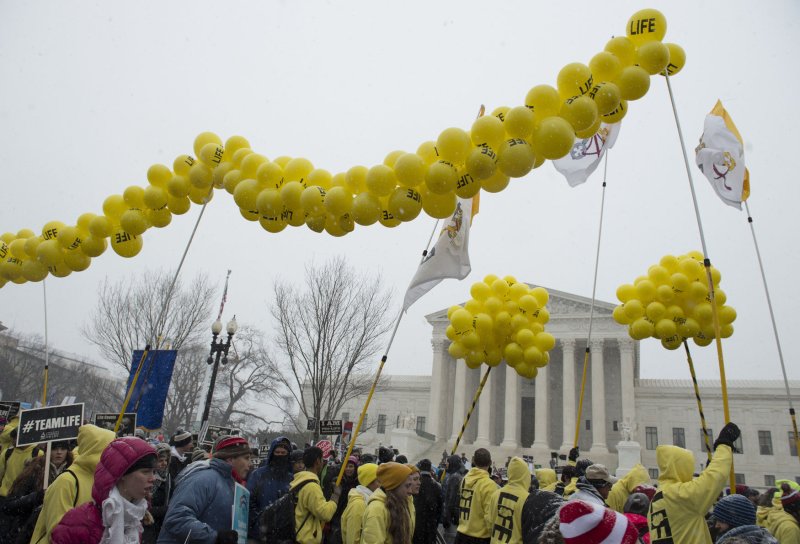The U.S. House of Representatives moved Tuesday to make permanent the "Hyde Amendment," which has been added to spending bills in Congress each year since 1976 to prevent the use of taxpayer funds for abortion services. The House passed it along party lines, with GOP members saying they believe the Senate will pass the law and send it to President Donald Trump to sign -- a signature they expect to receive based on his anti-abortion stance. The new law's passage was timed, like the annual vote on the amendment, to coincide with the March for Life, the annual pro-life rally protesting abortion and the 1973 Roe v. Wade Supreme Court decision legalizing abortion. Protesters are pictured on January 22, 2016, at the protest outside the U.S. Supreme Court in Washington, D.C. File photo by Molly Riley/UPI |
License Photo
Jan. 25 (UPI) -- The U.S. House of Representatives moved Tuesday to make permanent a provision attached to every spending bill since the mid-1970s restricting the use of federal tax dollars for abortion services.
The House passed the bill along largely party lines Tuesday not only codifies the national restriction as law but prevents the District of Columbia from using funds apportioned to it by Congress for abortion services for low-income women, the latter of which had Democrats calling foul.
The decision comes one day after President Donald Trump, who said throughout his campaign for president he is anti-abortion and would make moves to diminish its availability, signed a presidential memorandum re-instituting a rule to prohibit any U.S. agency from funding non-governmental aid organizations that offer information about abortion as part of their family planning services.
Aside from the section covering services funded in Washington, D.C., the bill is similar to the "Hyde Amendment," passed each year since 1976 and attached to a spending bill early in each session Congress. It's passage in previous years, as with this year, is timed with the annual March for Life protest by pro-life advocates in Washington, D.C., this year scheduled for Friday, Jan. 27.
The bill also includes a provision that would complicate women requiring abortion services who buy health insurance through the Affordable Care Act's exchanges and receive federal subsidies to pay for their policies, according to members of Congress.
Maryland Democratic Rep. Jamie Raskin called the D.C. provision of the law "a special assault on liberty" while criticizing the overall idea as an attack on women's rights.
"A few days ago, million of Americans made history by marching for freedom and equality against an administration that keeps threatening to grab women by their privacy rights," Raskin said.
Wyoming GOP Rep. Liz Cheney told reporters that anti-abortion women's groups were excluded from last Saturday's national protests, but said she expected a "very large turnout" for this weekends' March for Life.
Many members of the GOP-controlled House think Republicans in the Senate can get the bill passed and delivered to Trump, who they believe will sign it based on the stance he has taken against abortion.
"We have a new president who will sign it," said Republican New Jersey Rep. Chris Smith. "I think there's a growing chorus of pro-lifers, not diminishing. We're going to find some ways of getting this to the president's desk."















